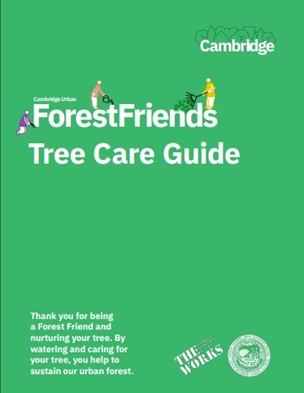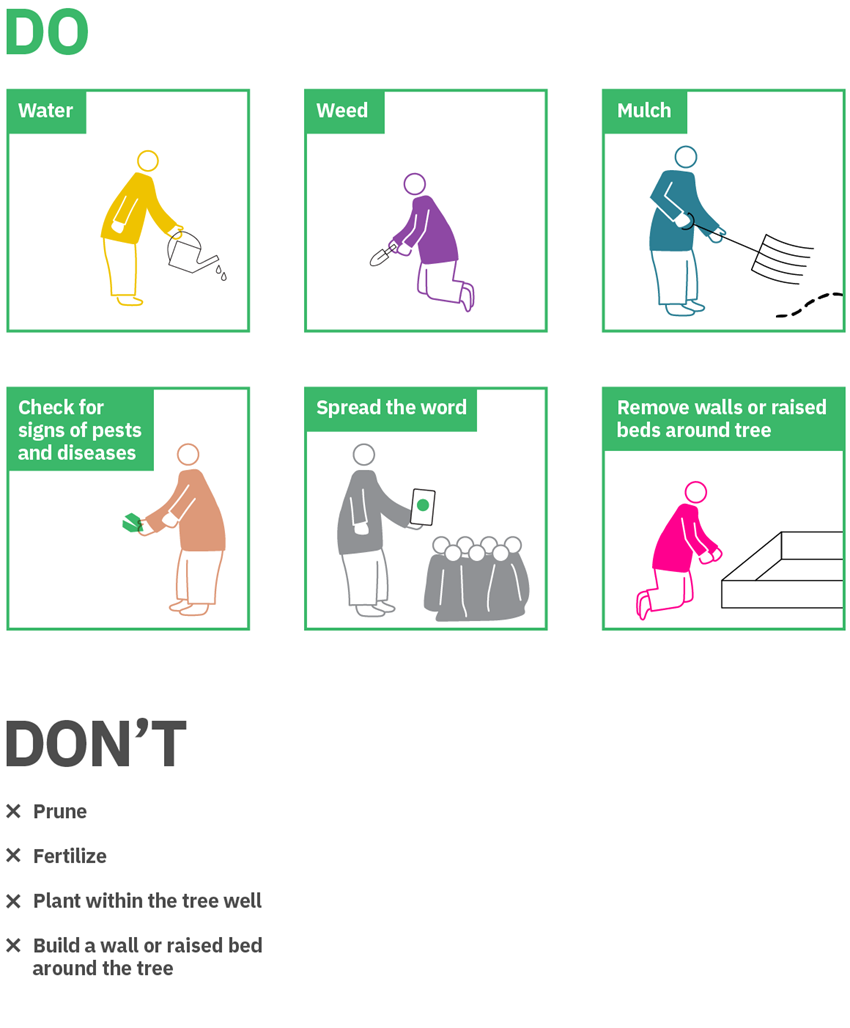We need your help to help maintain a healthy, vibrant urban forest! Become a Cambridge Urban Forest Friend today!
Our trees make our neighborhoods more beautiful, shade our parks and walkways, and clean our air and water. The urban forest is also an essential resource when it comes to fighting climate change.
As a Forest Friend volunteer, you will contribute to the vitality of our urban forest, protect our planet, and make our city a better place to live.
Moving to the city can be challenging for a young tree. The primary goal of the Forest Friend program is to help new trees become established so they can provide benefits to our communities for generations. Choose a street tree near your home, business, or school and help keep it healthy by watering it and tending to the tree well.
Sign up to receive the monthly Forest Friends newsletter
Below is a list of the essential dos and don'ts involved in caring for a street tree. A more in-depth description of these requirements can be found in the Forest Friend guide and the FAQ section.

Cambridge Forest Friends Tree Care Guide

How to Start
- Visit our Forest Friends Interactive Map
- Enter your address (street name first, followed by address number) to zoom the map to your location and view available trees
- Choose a tree by clicking on it, then fill out the form
Requirements
Any Cambridge resident willing to water the tree and provide some general care for the tree is welcome to become a Cambridge Urban Forest Friend.
Interactive Map
For those trying to access this map on an iPhone, remember to turn off your Pop-up blocker. Go to Settings > Safari > Block Pop-ups and make sure to disable that option.
Having issues with the map? Contact Kristen Kelleher at Public Works - kkelleher@cambridgema.gov / 617-349-4825.
Spread mulch within the tree well, being careful not to let the mulch touch the tree trunk. The mulch should reach a depth of three inches. You have mulched correctly when it is three inches thick and three inches away from the trunk of the tree. A compost-mulch blend is highly recommended because bark mulch alone offers little nutritional value. Program participants are eligible for one free bag of a compost-mulch blend. Please contact us to inquire about how to receive your bag.
- Mulch insulates the soil helping to provide a buffer from heat and cold temperatures.
- Mulch retains water helping to keep the roots moist.
- Mulch helps keep weeds out to help prevent root competition.
- Mulch prevents soil compaction.
When you become a Cambridge Urban Forest Friend, you are asked to input a name that will display on the interactive map on the city’s website. You may choose to write “Anonymous.”
https://www.mapsonline.net/cambridgema/trees.html
Raised construction in a tree well (wooden boxes, bricks, hardscape materials) is forbidden. This changes the grade around the base of the tree, burying the tree’s young feeder roots and making them struggle for air and water. Most of the tree’s roots are found in the top 6-8” of soil. In many cases, planting directly in a tree well is harmful as well and can kill a tree. There are cases where planting certain species strategically around a tree can be beneficial; to avoid harming or killing a tree, call the Department of Public Works Forestry Department for advice before planting in a tree well.
Dog waste (both liquid and solid) is extremely harmful to tree health. Their urine burns the tree trunk and their waste throws off the balance of nutrients in the soil. Please keep dogs out of tree wells and utilize dog parks instead.
Trees have many far-reaching benefits in urban environments. They help remove airborne pollutants and absorb CO2—the leading driver of climate change. They help cool cities by providing shade; they reduce flooding events and intercept polluted stormwater from entering waterways; they reduce noise pollution, provide an essential natural habitat for birds and squirrels; and, in addition to bringing aesthetic value to our communities, they improve our well-being by lowering stress and anxiety.
E-mail cambridgetrees@cambridgema.gov or call 617-349-4800.
Street trees need approximately 20 gallons of water per week. It is recommended that you water the tree at least once a week, between the months of May and October, by filling a Gator Bag with 20 gallons of water using your garden hose. If your hose does not reach the tree, use a container (1-gallon sized or larger) to fill the Gator Bag with water. If you are not using a Gator Bag, water the tree slowly at its base.
Gator Bags are recommended for trees with a trunk diameter of 4 inches or less. Gator Bags can be picked up free of charge at the front office of the Department of Public Works at 147 Hampshire St Cambridge, MA 02139. They are collected by the city in November, and so if you wish to keep yours, be sure to remove it before then. If the City removes your Gator Bag, you can pick one up from the Department of Public Works in the spring.
Gator Bags can reduce air circulation and increase moisture levels when placed directly on the trunk of a tree. These are favorable conditions for insects or diseases that can reduce the vitality of a newly planted tree.
If your hose does not reach the tree use a container (1-gallon sized or larger) to fill the Gator Bag or to slowly water the base of the tree directly. Compacted soil reduces a water’s ability to infiltrate the soil and can lead to water runoff. Water runoff will erode soil and mulch. If the soil is compacted gently loosen it with a trowel so water can percolate in.
Newly planted trees require the most care to survive. The City of Cambridge will continue to water newly planted trees within their first 5 years, so it is unlikely they would die from the occasionally missed watering. However, not all newly planted trees survive, and so your consistent watering will greatly increase their health and chances of survival. Established trees are less likely to die from missed watering.
It is hard to over-water a street tree. However, avoid filling the Gator Bag more than four times in one week, especially when the weather is rainy or cool, or when the soil is saturated.
If you live in an apartment and watering is too difficult, you can still adopt a tree and provide care in the form of weeding and mulching. Any amount of care is helpful and needed.
No, because based on City of Cambridge Water rates, it costs less than $0.35 a month to water a street tree with a Gator Bag if you water once a week, or $1.75 total from mid - May to mid - October.
Wearing gloves, pull the weeds by the base, shake off excess dirt, and collect in a bag to be disposed of as yard-waste or trash. Be sure to watch out for sharp objects that may be around the tree. Weeds compete with the tree for nutritional resources and can become a physical obstacle to walkways when severely overgrown.
Street trees need approximately 20 gallons of water per week. It is recommended that you water the tree at least once a week, between the months of May and October, by filling a Gator Bag with 20 gallons of water using your garden hose. If your hose does not reach the tree, use a container (1-gallon sized or larger) to fill the Gator Bag with water. If you are not using a Gator Bag, water the tree slowly at its base.